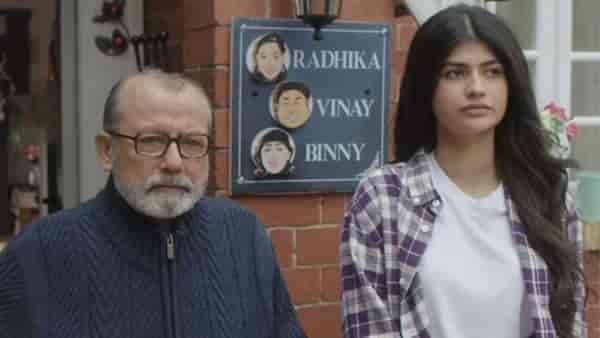Binny And Family Is A Tear-Jerker That Does Its Job
Binny and Family is an unexpectedly profound film that treats characters as people instead of burdening them with the need for messaging. None of them is good or bad. They are just young and old.

Last Updated: 04.05 PM, Sep 28, 2024
SSANJAY TRIPAATHY'S Binny and Family is a film that should not work. The story is as old as time: younger and older generations pitted against each other. Hindi films have routinely rendered the generation gap in conflicting terms to teach the youth a lesson. Ravi Chopra’s Baghban (2003) paved the way and other films, more recently Vikas Bahl’s Gooodbye (2022), reiterated it. Tripaathy’s outing tinkers with the setting a little — parents are replaced by grandparents — but the overwhelming diktat of ‘It’s all about loving your family’ remains the same. Yet, what comes together in the process is an oddly moving film that freely manipulates and in a bewildering way, is better for it.
Binny and Family revolves around a teenage girl, Binny (Anjini Dhawan making her debut) who lives in London with her parents. Every year her grandparents visit them from Bihar for a couple of months. The arrival disrupts their routine in little but defining ways. Like the makeshift bar in the house is promptly hidden, her father (the terrific Rajesh Kumar) chooses to smoke in his room and Binny has to share her room. These worked out before but she is a grown up now and inhabits all the symptoms of adulthood. She listens to music her parents cannot make sense of, smokes up in the bathroom, and nurses an unrequited crush on a classmate. With her grandparents coming, an inevitable threat of confrontation looms ahead. But Binny and Family is not that film.
The outing is about the generational gap but the conflict is not empty. The point of contention is not that elders are always correct and to hold out that thought till the young are guilt-tripped into acknowledging it. The genesis here is not that Binny needs to learn a lesson from her grandfather, a retired professor who helps out others in matters of pension. Written by Tripaathy, Binny and Family is an unexpectedly profound film that treats characters as people instead of burdening them with the need for messaging. None of them is good or bad. They are just young and old. The awareness of this informs the specificity of the problem at hand.

The annual visit of Binny’s grandparents (Pankaj Kapur and Himani Shivpuri) is due and Binny has thrown a fit. It is not her grandfather’s patriarchal ways nor is it the submissiveness of her grandmother (Himani Shivpuri) which to her eyes might be regressive. It is just that Binny is reluctant to share her space. She needs her own room and believes that her parents are being unfair in asking her to share it. The lack of space makes sense in the larger context. As an immigrant, Binny is a misfit in a foreign country. Her Gujarati friend leans on social media to adapt while Binny struggles.
Equally specific is the guilt that arrives in the narrative. Stories like these use remorse to drive their point home. Think of Gooodbye and the way Rashmika Mandanna’s character is compelled to marinate in regret by her father (Amitabh Bachchan, who else?), and in extension, the film — after she misses her mother’s calls and finds that she died the next day. The guilt here is manufactured and fabricated to underline the follies of age.

Binny and Family steers clear of any of that. A family tragedy occurs, inflicting guilt on Binny only for both generations to find a middle-ground where experience and newness meet. It is a particularly human conviction on the part of the film that resists victimising or villainising anyone. This resistance, rewarding and impressive in equal measure, is evident in other aspects as well. Like Binny’s grandfather calling his London-stationed son in the moment of crisis and not his daughter who lives close by. Or the time he scolds Binny for staying out late, adding that girls should be more careful. The film touches upon them without milking to make a statement, underlining ever so slightly that in most families, dysfunctionality is what makes them function.
The false note occurs in the third act when one exposition follows another. The film is still watchable but the subtext is blatantly reiterated. If none of this comes close to hijacking the Binny and Family, not even the producer Mahaveer Jain’s ridiculous prophecy at the end: “Happy family is the foundation of a happy nation”, it is because the outing is stacked with affecting performances. Anjini Dhawan is supremely effective as the young Binny who is forced to shoulder responsibility and guilt. There is a spontaneity to her turn which makes her a natural. But if the film transforms into a tear-jerker even when it visibly pulls the strings, it is because of Pankaj Kapur. The actor lends a lived-in grief to his role as he mourns and frequently breaks down. It is incredible to watch him enliven little moments as he crafts a performance that is a testimony to his craft. The story might be about Binny and her family but there would be no Binny and Family without Pankaj Kapur.

 Premium
Premium